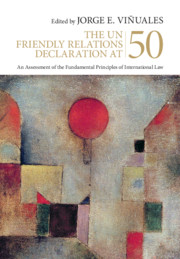(Source: CUP)
Cambridge University Press is publishing a book on 50 years of the UN Friendly Relations Act.
ABOUT THE BOOK
The year 2020 marks the 75th anniversary of the United Nations Organisation, and the 50th anniversary of the United Nations Friendly Relations Declaration, which states the fundamental principles of the international legal order. In commemoration, some of the world's most prominent international law scholars from all continents have come together to offer a comprehensive study of the fundamental principles of international law. Each chapter in this volume reflects decades of experience, work and reflection by the most authoritative voices of the field. At the same time, the book is an invitation to end narrow specialisation and re-engage with the wider body of rules and processes that lie at the foundations of the international legal order.
ABOUT THE AUTHOR
Jorge E. Viñuales, University of Cambridge
Jorge E. Viñuales holds the Harold Samuel Chair at the University of Cambridge and is a Fellow of the Lauterpacht Centre for International Law and of Clare College. He is also a Member (Associé) of the Institut de Droit International. At Cambridge, he founded and directed the Cambridge Centre for Environment, Energy and Natural Resource Governance (C-EENRG). Professor Viñuales has published many studies on international law, and he has wide experience as counsel, expert and adjudicator.
TABLE OF CONTENTS
Foreword Georges Abi-Saab
1. Introduction: the fundamental principles of international law – an enduring ideal? Jorge E. Viñuales
2. The historical origins and setting of the Friendly Relations Declaration Samuel Moyn and Umut Özsu
Part I. The Principles of the Friendly Relations Declaration:
3. The prohibition of the use of force Olivier Corten
4. Peaceful settlement of international disputes Shotaro Hamamoto
5. The duty not to intervene in matters within domestic jurisdiction Dire Tladi
6. Co-operation Laurence Boisson de Chazournes and Jason Rudall
7. Self-determination Marcelo G. Kohen
8. Sovereign equality Martti Koskenniemi and Ville Kari
9. Good faith Guillaume Futhazar and Anne Peters
Part II. Fundamental Principles of International Law Beyond the Friendly Relations Declaration:
10. Human rights protection as a principle Eibe Riedel
11. The fundamental principles of international humanitarian law Jia Bing Bing
12. Prevention of environmental harm Leslie-Anne Duvic-Paoli and Jorge E. Viñuales
13. Freedoms in common areas Tullio Treves
14. Principles governing the global economy Jürgen Kurtz, Jorge E. Viñuales and Michael Waibel
15. The Friendly Relations Declaration at 50 Pierre-Marie Dupuy.
1. Introduction: the fundamental principles of international law – an enduring ideal? Jorge E. Viñuales
2. The historical origins and setting of the Friendly Relations Declaration Samuel Moyn and Umut Özsu
Part I. The Principles of the Friendly Relations Declaration:
3. The prohibition of the use of force Olivier Corten
4. Peaceful settlement of international disputes Shotaro Hamamoto
5. The duty not to intervene in matters within domestic jurisdiction Dire Tladi
6. Co-operation Laurence Boisson de Chazournes and Jason Rudall
7. Self-determination Marcelo G. Kohen
8. Sovereign equality Martti Koskenniemi and Ville Kari
9. Good faith Guillaume Futhazar and Anne Peters
Part II. Fundamental Principles of International Law Beyond the Friendly Relations Declaration:
10. Human rights protection as a principle Eibe Riedel
11. The fundamental principles of international humanitarian law Jia Bing Bing
12. Prevention of environmental harm Leslie-Anne Duvic-Paoli and Jorge E. Viñuales
13. Freedoms in common areas Tullio Treves
14. Principles governing the global economy Jürgen Kurtz, Jorge E. Viñuales and Michael Waibel
15. The Friendly Relations Declaration at 50 Pierre-Marie Dupuy.
More info here
(source: ESCLH Blog)

